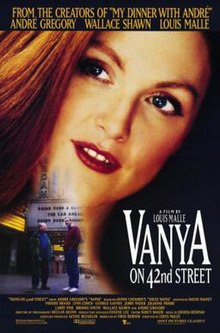Vanya on 42nd Street
| Vanya on 42nd Street | |
|---|---|

Theatrical film poster
|
|
| Directed by | Louis Malle |
| Produced by | Fred Berner |
| Written by | Andre Gregory |
| Based on |
Uncle Vanya by Anton Chekhov, adapted by David Mamet |
| Starring | |
| Music by | Joshua Redman |
| Cinematography | Declan Quinn |
| Edited by | Nancy Baker |
| Distributed by | Sony Pictures Classics |
|
Release date
|
September 13, 1994 |
|
Running time
|
119 minutes |
| Language | English |
Vanya on 42nd Street is a 1994 film directed by Louis Malle and screenplay by Andre Gregory. The film is an intimate, interpretive performance of the play Uncle Vanya by Anton Chekhov as adapted by David Mamet. The film stars Wallace Shawn and Julianne Moore.
Over the course of three years, director Andre Gregory and a group of actors came together on a voluntary basis in order to better understand Chekhov's work through performance workshops. Staged and filmed entirely within the vacant shell of the then-abandoned New Amsterdam Theater on 42nd Street in New York City, they enacted the play rehearsal style on a bare stage with the actors in street clothes. Free from any commercial demands, their performances were for an invited audience only. Gregory and director Louis Malle decided to document the play as they had developed it. The film was the result of the collaborative process. It was the last film of Malle's career.
Workshop rehearsals with Gregory and the cast originally took place at the abandoned Victory Theater on 42nd Street in New York City. The filmed version was shot entirely within the New Amsterdam Theatre, also on 42nd Street. Built in 1903, the theatre was the original home of the Ziegfeld Follies, a historical tidbit mentioned in the film during some pre-show banter. In the late 1930s, the New Amsterdam Theatre was transformed into a movie palace. The theatre remained a movie palace until it "temporarily" closed in 1982.
At the time Vanya on 42nd Street was filmed, the theatre had been abandoned for over ten years and was in a state of severe disrepair. Rats had chewed through much of the stage rigging, and flooding and mice made the stage unusable, so that they were restricted to a section of what had been the orchestra.
...
Wikipedia
